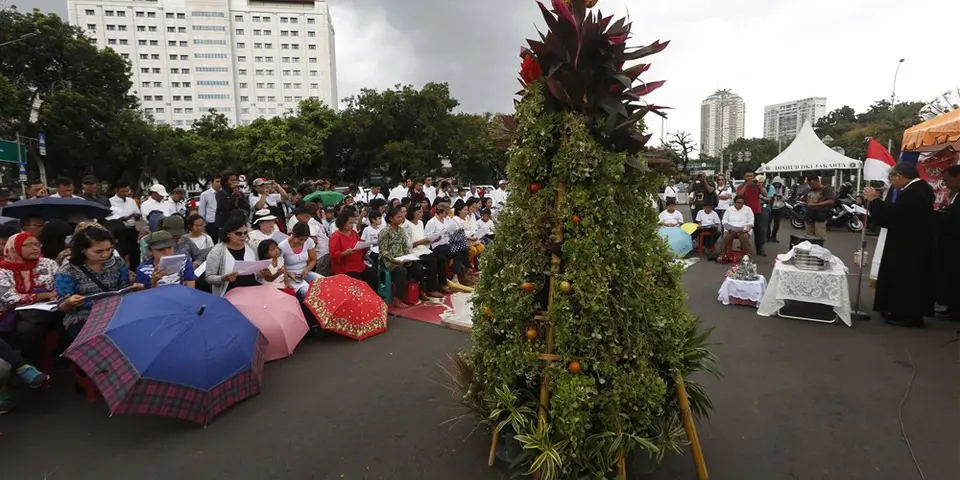
Indonesia should lead by example on freedom of religion and belief in ASEAN
January 26, 2023

By Eva Kusuma Sundari.
We Indonesians like to take pride in the national motto of Bhinneka Tunggal Ika (unity in diversity). We like to boast that we are a nation of tolerant pluralists, especially at a time when intolerance and exclusivism are on the rise globally.
Yet President Joko “Jokowi” Widodo’s recent remarks about the importance of safeguarding freedom of religion and worship during a meeting of regional leaders are a timely reminder that Indonesia still has a long way to go on this front. Moreover, our country, as the current ASEAN chair and its biggest democracy should play a role in promoting human rights in the region, including freedom of religion and belief. And Indonesia should lead first by setting an example for other countries to follow.
“Religion and worship are guaranteed in our constitution,” Jokowi said during the opening of the National Coordination Meeting of Regional Heads and Regional Leaders Coordination Forums (FKPD) on Jan. 17. “This must be understood by the military district commander, the National Police chief, the regional police chief, the regional military commander, it must be understood by the Prosecutor’s Office and the Attorney General’s Office,” he added, sending a strong message to local administrations and other regional institutions to ensure people’s right to worship, regardless of their religion or belief, as mandated by Article 29 of the Constitution.
The issue of religious freedom at the regional level is a fraught one, as shown in various studies. PUSAD Paramadina researcher, Siswo Mulyartono, found at least 122 cases of local communities resisting the construction of houses of worship from 2015 to 2020, while human rights group Setara Institute recorded at least 573 disruptions to worship and places of worship across the country between 2007 and 2022.
What Jokowi failed to mention is the central government’s complicity in these violations of religious freedom. Many of these disturbances have occurred because intolerant actors feel empowered by a joint ministerial decree issued in 2006 that requires local resident approval for the construction of any new place of worship. All too often, this becomes an issue when minority religious communities look to build temples, churches or mosques in areas where residents are predominantly of another faith.
Even when the complicated technical and administrative requirements in the joint decree are satisfied, hardline groups often successfully block the construction of new houses of worship by citing the lack of some residents’ approval.
A case in point is the GKI Yasmin church in Bogor, West Java, whose construction permit was revoked in 2011 by the mayor under pressure from intolerant groups. In the end, even after the construction permit was upheld by the Constitutional Court, the church was relocated to a different site in 2021 after a 15-year legal fight.
Similarly, last year, a plan to build a church on land belonging to the Huria Kristen Batak Protestan (HKBP) in Cilegon, Banten, was also blocked by regional officials, despite the fact that the church had already gathered the names of 112 congregants and 70 local residents. To this day, Cilegon, home to over 7,000 Christians, remains without a church where its Christian population can attend religious services.
Those cases should remind the government that it is vital to ensure that the regulations are implemented on the ground in line with the Constitution. Another example is the mandatory hijab requirement in educational institutions, which is currently spreading in the country. This shows how neutral, or even positive, regulations can be twisted and wrongly implemented at the local level, resulting in massive violations of Indonesian women’s rights.
According to a recently published report from ASEAN Parliamentarians for Human Rights (APHR) titled Restricting Diversity: Mapping of Legislation of Freedom of Religion or Belief in Southeast Asia, Indonesia is not alone in restricting people’s rights to worship in the region. Similar problematic regulations exist in other ASEAN countries, such as Laos, Myanmar and Vietnam.
Government regulations and policies that hinder or prevent the fulfillment of citizens’ constitutional right to worship are contrary to the state’s human rights obligations under the International Covenant on Civil and Political Rights (ICCPR). As the UN Human Rights Committee emphasizes, “freedom to manifest religion or belief in worship … extends to … the establishment of places of worship.”
Jokowi’s words at the meeting of regional leaders, as well as earlier remarks from Jokowi acknowledging and expressing regret for 12 cases of past gross human rights violations, are a welcome step in the right direction. But the President’s days are numbered. If he is to fulfill the promises to uphold human rights made when he first ran for president, he needs to take concrete action now.
Immediate actions should include, at least, repealing the 2006 joint ministerial decree on the construction of houses of worship, and providing comprehensive training to officials down to the regional level on freedom of religion and belief in order to correctly implement policies on the ground.
By doing that, Indonesia would unequivocally demonstrate its leadership as ASEAN chair in promoting and protecting freedom of religion or belief. As stated in article 22 of the ASEAN Declaration of Human Rights: “Every person has the right to freedom of thought, conscience and religion. All forms of intolerance, discrimination and incitement of hatred based on religion and beliefs shall be eliminated.”
Eva Kusuma Sundari is a board member of ASEAN Parliamentarians for Human Rights (APHR), and a former member of the Indonesian House of Representatives.
ASEAN Parliamentarians for Human Rights (APHR) was founded in June 2013 with the objective of promoting democracy and human rights across Southeast Asia. Our founding members include many of the region's most progressive Members of Parliament (MPs), with a proven track record of human rights advocacy work.